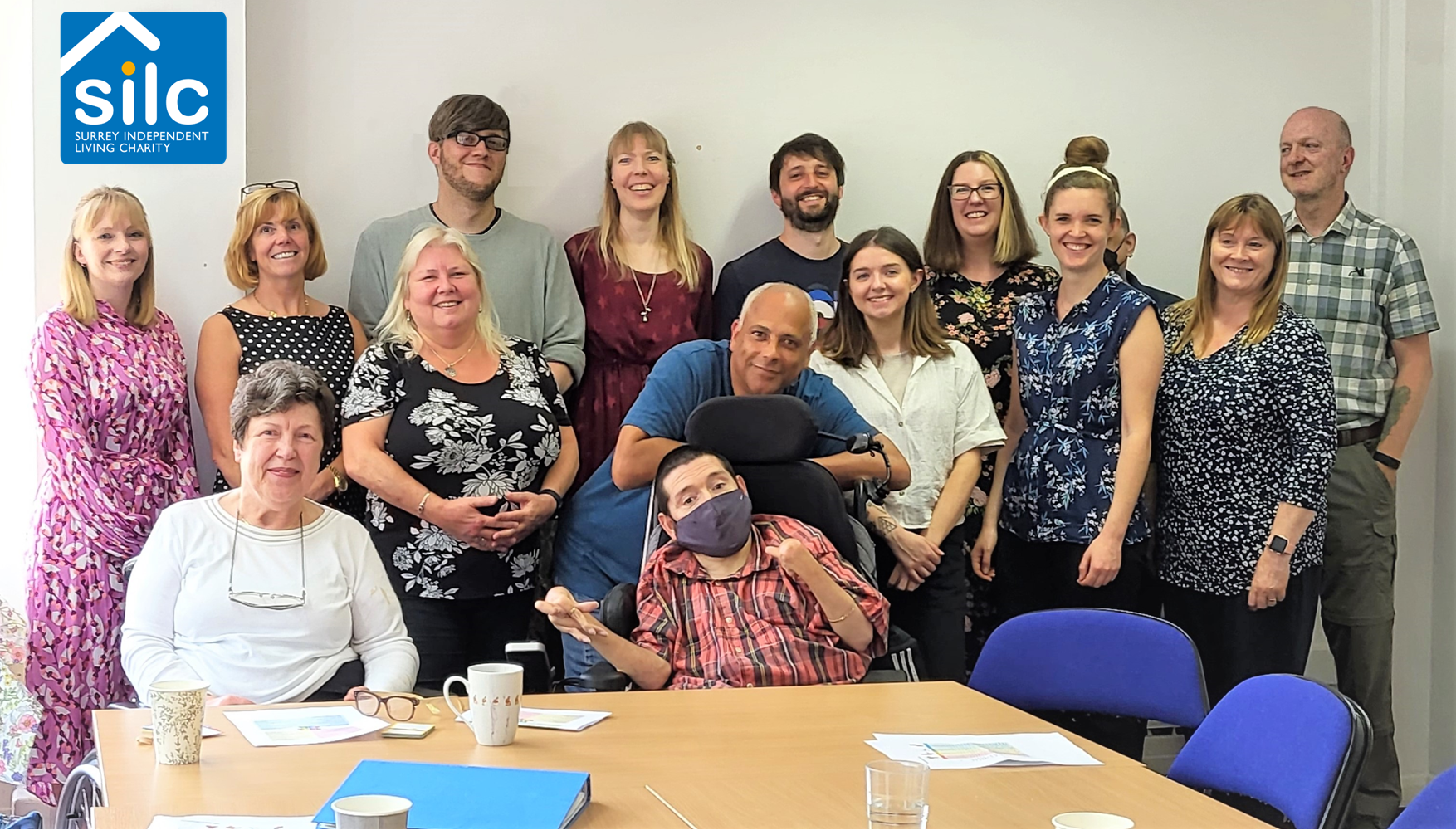Becoming a Trustee
If you have a question that isn't answered here, then you can contact us to discuss the issue further.

We are not currently recruiting Trustees, but there will be opportunities in the future!
If you feel you have the skills, passion and time required for this volunteer role, then SILC would love to hear from you!
What does a Trustee do?
Trustees’ 6 main duties (as outlined on .gov.uk)
1. Ensure your charity is carrying out its purposes for the public benefit
You and your co-trustees must make sure that the charity is carrying out the purposes for which it is set up, and no other purpose. This means you should:
- ensure you understand the charity’s purposes as set out in its governing document
- plan what your charity will do, and what you want it to achieve
- be able to explain how all of the charity’s activities are intended to further or support its purposes
- understand how the charity benefits the public by carrying out its purposes
Spending charity funds on the wrong purposes is a very serious matter; in some cases trustees may have to reimburse the charity personally.
Find out more:
The essential trustee - purposes and public benefit
2. Comply with your charity’s governing document and the law
You and your co-trustees must:
- make sure that the charity complies with its governing document
- comply with charity law requirements and other laws that apply to your charity
You should take reasonable steps to find out about legal requirements, for example by reading relevant guidance or taking appropriate advice when you need to.
Registered charities must keep their details on the register up to date and ensure they send the right financial and other information to the commission in their annual return or annual update.
Find out more about your governing document and the law.
Send a charity’s annual return
3. Act in your charity’s best interests
You must:
- do what you and your co-trustees (and no one else) decide will best enable the charity to carry out its purposes
- with your co-trustees, make balanced and adequately informed decisions, thinking about the long term as well as the short term
- avoid putting yourself in a position where your duty to your charity conflicts with your personal interests or loyalty to any other person or body
- not receive any benefit from the charity unless it’s properly authorised and is clearly in the charity’s interests; this also includes anyone who is financially connected to you, such as a partner, dependent child or business partner
Find out more:
The essential trustee - act in your charity’s best interests
4. Manage your charity’s resources responsibly
You must act responsibly, reasonably and honestly. This is sometimes called the duty of prudence. Prudence is about exercising sound judgement. You and your co-trustees must:
- make sure the charity’s assets are only used to support or carry out its purposes
- not take inappropriate risks with the charity’s assets or reputation
- not over-commit the charity
- take special care when investing or borrowing
- comply with any restrictions on spending funds
You and your co-trustees should put appropriate procedures and safeguards in place and take reasonable steps to ensure that these are followed. Otherwise you risk making the charity vulnerable to fraud or theft, or other kinds of abuse, and being in breach of your duty.
Find out more:
The essential trustee - manage your charity’s resources responsibly
5. Act with reasonable care and skill
As someone responsible for governing a charity, you:
- must use reasonable care and skill, making use of your skills and experience and taking appropriate advice when necessary
- should give enough time, thought and energy to your role, for example by preparing for, attending and actively participating in all trustees’ meetings
Find out more:
The essential trustee - act with reasonable care and skill
6. Ensure your charity is accountable
You and your co-trustees must comply with statutory accounting and reporting requirements. You should also:
- be able to demonstrate that your charity is complying with the law, well run and effective
- ensure appropriate accountability to members, if your charity has a membership separate from the trustees
- ensure accountability within the charity, particularly where you delegate responsibility for particular tasks or decisions to staff or volunteers
Find out more:
SILC Trustee Role Description:
Surrey Independent Living Charity (SILC) Trustee Role Description
A member of the Board of Trustees will be expected to perform a number of tasks. These falls into two main groups: legal duties and managerial tasks
- To ensure that the organisation pursues its objects as set out in the governing document.
- To have read and understood the constitution.
- To act at all times in the interests of the beneficiaries.
- To understand the legal responsibilities of the board of trustees.
- To ensure that the organisation acts within the law: as an employer, in respect of equal opportunities, meeting health and safety requirements, as a charity and so on.
- To ensure that all money and assets are prudently managed and used in pursuit of the objects of the organisation.
- To make sure that money is spent for the purposes for which it was given.
- To ensure that the organisation accounts for its activities to its funders, the Charity Commissioners, its members, the local community and others as required.
- To work jointly with the other trustees.
- To ensure that the organisation manages its affairs reasonably and properly.
- To work in the interests of the organisation, and not for personal gain.
- To ensure that the board of trustees takes proper professional advice on matters in which it does not have competence.
SILC Trustee Person Specification:
Surrey Independent Living Charity (SILC) Trustee Person Specification
- A commitment to the organisation and a passion for the cause
- A willingness to devote the necessary time and effort: we estimate that this would be no more than 2-3 hours per month, but we would welcome more time if desired by the individual for specific projects.
- Strategic vision: the Board of Trustees must work with operational management to set a strategy to take the charity forward and ensure its ongoing viability and direction. Having agreed the strategy, the Board of Trustees must take leadership with its implementation
- Good, independent judgement
- An ability to think creatively
- A willingness to speak your mind
- An understanding and acceptance of the legal duties, responsibilities and liabilities of trusteeship
- An ability to work effectively as a member of a team
- Selflessness, integrity, objectivity, accountability, openness, honesty and leadership.
- A willingness to be available to all staff for advice and enquiries on an ad hoc basis.
How much time will I have to commit?
The minimum requirement is attendance at 6 Trustees meetings a year along with an additional time commitment of 2-3 hours a month. Any additional support would also be highly valuable, welcome and appreciated.
Trustee meetings currently take place on a Wednesday lunch time, alternate months, and are held in the Board Room at our offices at Astolat, Burpham, GU4 7HL. In person attendance is preferred, although the meeting is also hosted on Zoom.
We are looking for someone who would be keen to attend and be involved in any fundraising initiatives, but these are not compulsory.
What are the benefits to becoming a trustee?
You will have the opportunity to work with an established and respected charity, join a small group of friendly, committed, and positive fellow trustees and work with a passionate, experienced, and knowledgeable staff team to deliver on a very worthy cause.
Volunteering as a SILC trustee will give you the opportunity to make a difference at a strategic level and ensure that the charity’s resources are used effectively to tackle the issues identified; changing our community for the better. Research has shown giving your time and energy to others is beneficial for your own mental health and wellbeing. It can make life feel more meaningful and provide a powerful sense of purpose to your life.
As a SILC Trustee you will be able to develop a range of useful board-related skills to support your own professional development such as in strategy, governance, leadership, business management, financial acumen, compliance and risk management, fundraising etc. Board trusteeship is particularly useful if you aim to lead people, set up your own organisation and / or plan sit on boards in future.
Our Chair of Trustees says “During the pandemic I became a local volunteer carrying out activities very different to my day job. What surprised me most was the number of people struggling to stay in their own homes - often not asking for help for fear of losing control over their lives. As a result, I became a Trustee of SILC – a charity that helps people stay in their own homes and in control. Being able to use my commercial skills to support a cause that matters to me has been very rewarding. I am enjoying getting to grips with the very different worlds of healthcare and charities and developing new transferable skills too. Finding SILC, and a cause I am passionate about, has provided me with a strong sense of purpose outside of my day-to-day work and I feel better for it!
A national survey of trustees revealed that 96% of trustees said that they had learnt new skills, 22% said that they had received a promotion because of it and 84% said that being a trustee made them happier.
Travel costs and expenses will be fully refundable.
Am I eligible to become a Trustee?
You must be at least 16 years old to be a trustee of a charity that is a company or a charitable incorporated organisation (CIO), or at least 18 to be a trustee of any other sort of charity.
You must be properly appointed following the procedures and any restrictions in the charity’s governing document.
You must not act as a trustee if you are disqualified unless authorised to do so by a waiver from the Commission. The reasons for disqualification are shown in the disqualifying reasons table and include:
- being bankrupt or having an individual voluntary arrangement (IVA)
- having an unspent conviction for certain offences (including any that involve dishonesty or deception)
- being on the sex offenders’ register
You can read the automatic disqualification guidance for charities which explains the disqualification rules in more detail.
There are further restrictions for charities that work with children or adults at risk.
Find out more:
How can I find out more and apply?
If you would like to find out more about the Charity and what is involved in being one of our Trustees, please contact Richard Davy (Chief Executive) at r.davy@surreyilc.org.uk or by calling him on 01483 662 680 and he will be more than happy to have an informal chat about the role.
If you would like to apply, please email your CV and covering letter to r.davy@surreyilc.org.uk and title the email 'SILC Trustee Application'.
You can also apply online.



